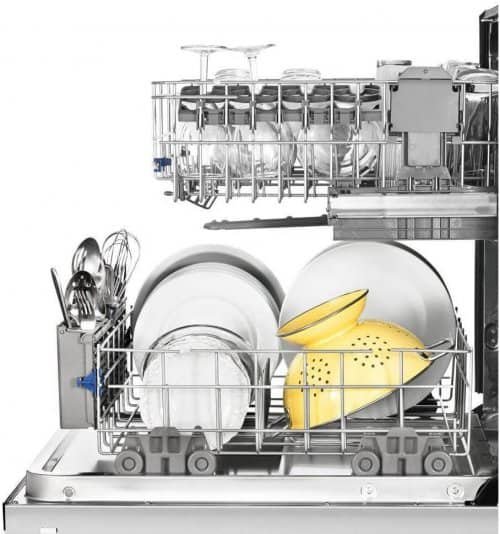Introduction: A dishwasher is an essential appliance in any modern kitchen, simplifying the task of cleaning dirty dishes. However, a clogged dishwasher can quickly turn this convenient appliance into a frustrating problem. In this article, we will explore the common causes of a clogged dishwasher, signs to look out for, and provide step-by-step instructions on how to fix the issue. By following these guidelines, you can restore your dishwasher’s functionality and ensure clean, spotless dishes after each cycle.
Table of Contents
Common Causes of a Clogged Dishwasher
A clogged dishwasher can result from various factors, and understanding the root causes is crucial for effective troubleshooting. Here are some common reasons why dishwashers get clogged:
A. Food particles and debris: Over time, food particles, such as small scraps and seeds, can accumulate in the dishwasher’s filter and drain, leading to blockages and reduced performance.
B. Grease and oil buildup: Grease and oil residue from dishes can solidify and cling to the interior walls and components of the dishwasher, obstructing water flow and causing clogs.
C. Mineral deposits and hard water residue: In areas with hard water, mineral deposits can accumulate on the dishwasher’s surfaces and interior components, hindering proper water circulation and drainage.
Signs of a Clogged Dishwasher
Recognizing the signs of a clogged dishwasher can help you address the issue promptly. Here are some indicators to look out for:
A. Slow drainage: If you notice that the water is draining slowly or there is standing water in the bottom of the dishwasher after a cycle, it is likely due to a clog.
B. Dirty dishes after a complete cycle: When your dishwasher isn’t cleaning dishes thoroughly, it may indicate a clog preventing proper water circulation and spray.
C. Standing water in the dishwasher: If you open your dishwasher and find standing water in the bottom, it is a clear indication of a clog that needs attention.
3. Steps to Fix a Clogged Dishwasher
Fixing a clogged dishwasher doesn’t always require professional assistance. You can try these steps to resolve the issue:
A. Clearing the dishwasher filter: Start by locating and removing the dishwasher filter. Rinse it under running water to remove any debris or food particles. Clean the filter thoroughly and reinstall it.
B. Checking and cleaning the spray arms: Remove the spray arms from the dishwasher and inspect them for any clogs or blockages. Use a toothpick or a small brush to remove any debris or mineral deposits. Rinse the spray arms with water and ensure that the spray nozzles are clear.
C. Unclogging the drain hose: Disconnect the drain hose from the dishwasher and check for any obstructions. Use a long, flexible brush or a plumbing snake to gently remove any clogs. Flush the drain hose with water to ensure it is clear of debris before reconnecting it.
D. Using vinegar or a dishwasher cleaner: Fill a dishwasher-safe bowl or cup with white vinegar or a dishwasher cleaner solution. Place it on the top rack of the dishwasher and run a complete cycle on the hottest setting. The vinegar or cleaner will help break down grease, remove mineral deposits, and eliminate odors.
E. Inspecting the garbage disposal connection: If your dishwasher is connected to a garbage disposal, check the connection for any clogs or blockages. Disconnect the hose and clear any debris using a brush or a small tool. Reconnect the hose securely.

Preventive Measures for a Clogged Dishwasher
To avoid future clogs in your dishwasher, consider implementing these preventive measures:
A. Scraping excess food off dishes: Before loading dishes into the dishwasher, scrape off any large food particles to prevent them from clogging the dishwasher’s filter or drain.
B. Pre-rinsing dishes before loading: Rinse dishes under running water to remove loose food particles and reduce the chances of clogging. However, avoid excessive pre-rinsing, as modern dishwashers are designed to handle a certain amount of food residue.
C. Regularly cleaning the dishwasher: Periodically clean the dishwasher’s interior, including the walls, racks, and spray arms, to remove grease, mineral deposits, and debris. Refer to the manufacturer’s instructions for the appropriate cleaning method.
D. Using a water softener or conditioner: If you have hard water, consider using a water softener or conditioner to minimize mineral buildup in the dishwasher. This will help maintain optimal performance and reduce the chances of clogs.
Troubleshooting Tips
In some cases, you may encounter additional issues with your dishwasher. Here are a few troubleshooting tips:
A. Identifying and fixing dishwasher leaks: If your dishwasher is leaking water, check the door seal for any damage or debris. Replace the seal if necessary. Additionally, inspect the dishwasher’s hoses and connections for any leaks or loose fittings.
B. Addressing unusual noises during operation: Unusual noises, such as grinding or rattling sounds, can indicate a problem with the dishwasher’s motor, pump, or spray arms. In such cases, it is advisable to consult a professional technician for repairs.
C. Dealing with persistent clogging issues: If you continue to experience frequent clogs despite regular maintenance, it is recommended to seek professional assistance. A technician can inspect the dishwasher more thoroughly and identify any underlying issues that may require repair or replacement.

How to clean a clogged dishwasher?
Cleaning a clogged dishwasher is a relatively simple process that can be done with supplies found in most households. The first step is to remove any debris from the dishwasher filter, which is typically located at the bottom of the appliance. Use a pair of pliers or tweezers to pull out any large pieces of food or other objects that may be blocking the drain. Once the filter is cleared, you can fill up a bucket with hot water and white vinegar and pour it into the dishwasher. This will help dissolve any soap scum or grease build-up that could be causing the clog. Let this solution sit for 10-15 minutes before running your dishwasher on its normal cycle. If this doesn’t work, you can try using a plumbing snake to reach further down into the drain and clear away any blockages.
How to fix clogged dishwasher?
There are a few steps you can take to fix a clogged dishwasher. First, check the filter and remove any debris that may be blocking the flow of water. You can also use a vacuum cleaner to suck out any food particles or other debris that may be stuck in the drain. If this doesn’t work, you may need to remove the drain hose and clean it out with a brush or pipe cleaner. Finally, make sure the water supply is on and running properly; if it’s not, try replacing the valve or opening up the line to allow for better flow. With these steps, your dishwasher should be back up and running in no time!
Can I use any type of dishwasher cleaner for unclogging my dishwasher?
Yes, you can use commercially available dishwasher cleaners or white vinegar as an effective and affordable alternative. Both options can help remove grease, mineral deposits, and odors from your dishwasher.
How often should I clean the dishwasher filter?
It is recommended to clean the dishwasher filter once every one to two months, depending on your dishwasher usage and the amount of food debris generated. Regular cleaning will help prevent clogs and maintain optimal performance.
Can I use bleach to clean my dishwasher?
No, it is not recommended to use bleach to clean your dishwasher. Bleach is a harsh chemical that can damage the dishwasher’s components and rubber seals. Stick to dishwasher cleaners or vinegar, which are safer and more suitable for this purpose.
What should I do if the clog persists after following the troubleshooting steps?
If the clog persists even after attempting the recommended steps, it is advisable to contact a professional dishwasher repair service. They will have the expertise and tools to diagnose and fix more complex clogging issues.
Are there any specific dishwasher brands that are more prone to clogs?
Clogging issues can occur in any dishwasher brand, as they are typically caused by factors such as food debris, grease, and mineral buildup. Regular maintenance and proper usage, regardless of the brand, will help prevent clogs and keep your dishwasher running smoothly.
Conclusion
A clogged dishwasher can be a frustrating inconvenience, but with the right knowledge and steps, you can easily resolve the issue. By understanding the common causes of clogs, recognizing the signs, and following the necessary troubleshooting steps, you can restore your dishwasher’s efficiency and ensure sparkling clean dishes every time.




1 thought on “How to Fix a Clogged Dishwasher”
Comments are closed.